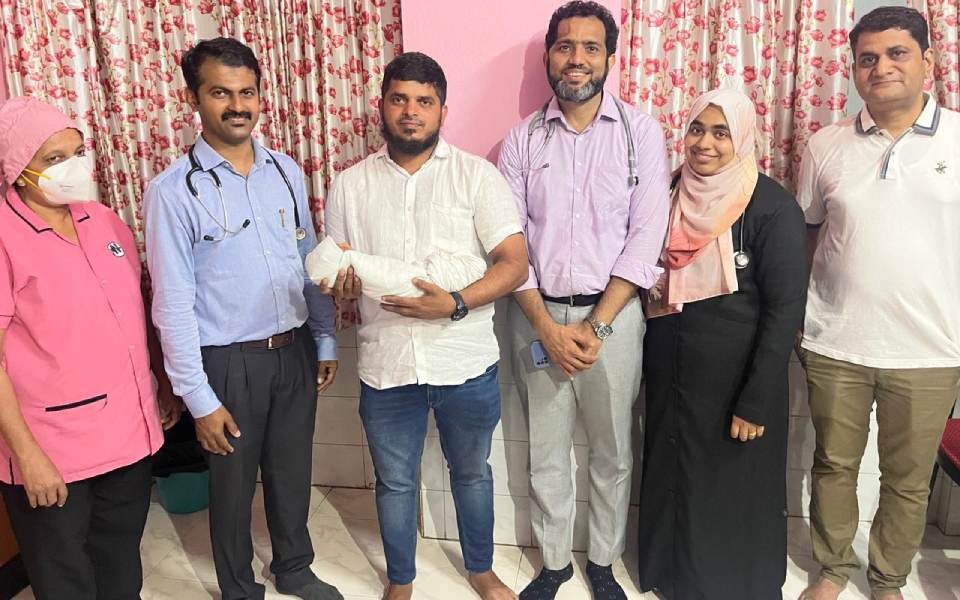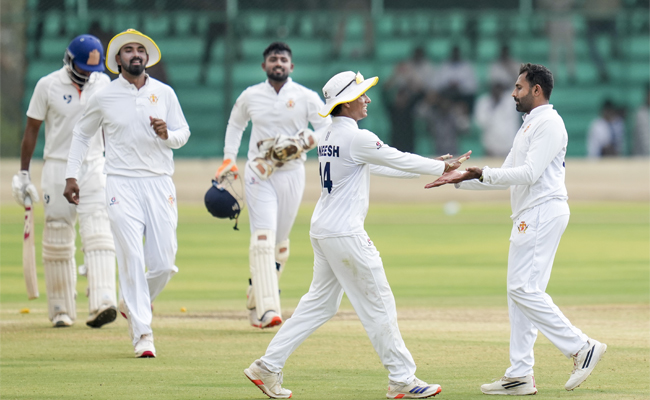Mangaluru: In a remarkable medical achievement, an Rh ISO immunised baby was successfully discharged after undergoing multiple blood transfusions , including rare intrauterine blood transfusion.
Dr. Ayshath Safoorah,consultant obstetrician and gynaecologist at Lifeline Health Care plus falnir, recognizing the complications of the case, referred the expectant mother to Dr. Murlidhar( fetal medicine )at Father Muller Hospital for ultrasound evaluation of foetal anemia.
After a thorough evaluation, Dr. Murlidhar carried out the intrauterine blood transfusion when the patient was in her 31st week of pregnancy.
The expectant mother, who came to Dr Ayshath Safoorah at 28th week of her pregnancy, faced complications due to antibodies present in her blood against the fetal blood cells ,along with increased blood pressure.
Three weeks following the intrauterine blood transfusion, the mother was induced at 34 weeks and delivered vaginally a preterm girl baby weighing 2.2 kg at Manglore Nursing home on 29th February .Both the mother's health and the baby's condition were closely monitored by the team of doctors at the hospital.
On Sunday, March 10, the newborn has been discharged.
What does positive Indirect Coombs Test mean?
When an Indirect Coombs Test is positive, it means that antibodies against red blood cells are present in the patient's blood serum. The test detects these antibodies indirectly by mixing the patient's serum with red blood cells of a known blood type. If antibodies in the serum react with the red blood cells, it indicates a positive result.
"In the context of pregnancy, a positive Indirect Coombs Test suggests that a pregnant woman has developed antibodies against the red blood cells of her unborn baby. This situation is often associated with Rh incompatibility, where the mother is Rh-negative, and the baby is Rh-positive.Injection Anti D is given after delivery to all Rh negative mothers to prevent this kind of iso immunisation," Dr. Ayshath Safoorah told Vartha Bharati.
What is Intrauterine blood transfusion?
Intrauterine blood transfusion is a complex medical procedure performed during pregnancy to address severe fetal anemia. Through the procedure, the baby in mother's womb is transfused blood.
Before the procedure, the mother undergoes thorough assessments, including ultrasound scans and blood tests. Continuous ultrasound guidance is used throughout the procedure to visualize the fetus, placenta, and the specific blood vessels involved. A thin, specialized needle is carefully inserted through the mother's abdomen and into the amniotic sac, guided by real-time ultrasound imaging. The goal is to reach the umbilical vein of the fetus.
Once the needle is correctly positioned, compatible blood is slowly transfused into the fetus through the umbilical vein. The amount of blood transfused is carefully controlled to avoid overloading the fetal circulation.
"Prior to the intrauterine blood transfusion,the hemoglobin of the foetus was just 4 g/dl. While this situation presented complications of cardiac failure , our medical team implemented measures to ensure a smooth transfusion ," Dr. Murlidhar who has handled cases of intrauterine blood transfusion during his practice abroad, told Vartha Bharati.
"Once the baby was delivered , she needed 2 exchange transfusions and one blood transfusion to combat the rising bilirubin levels due to hemolysis. Throughout the exchange blood transfusion, our medical team comprising Dr Preetham , faced challenges associated with the fluctuating and rising hemoglobin levels of the baby. The unexpected variations required vigilant monitoring and immediate responses to ensure the baby's stability," Dr. Abdul Bashith said while also adding that the team was overjoyed with the successful procedure and to see the baby and mother healthy.
Dr. Abdul Bashith also added that both mother and baby would require follow up at the hospital with their first visit being scheduled after 1 week .
Dr. Abdul Basith thanked and appreciated other members of the team including Manglore Nursing home NICU staffs and management, for their care and support.
Let the Truth be known. If you read VB and like VB, please be a VB Supporter and Help us deliver the Truth to one and all.
Manjeshwar: The participation of a CPI leader in a Hindu convention organised by the RSS has triggered discussion in political circles.
Sundari Shetty, former president of Meenja panchayat and a district committee member of the CPI in Kasaragod, attended the Hindu gathering held in Meenja. She offered floral tribute to a portrait of Bharat Mata and also addressed the gathering from the stage, which has led to controversy.
Following the development, the CPI district unit has issued a notice to Sundari Shetty seeking an explanation. Party sources said that the presence of a senior leader of a party that follows communist ideology at a Hindu convention has caused unease within the party.
There are indications that disciplinary action may be initiated against her in connection with the incident.





